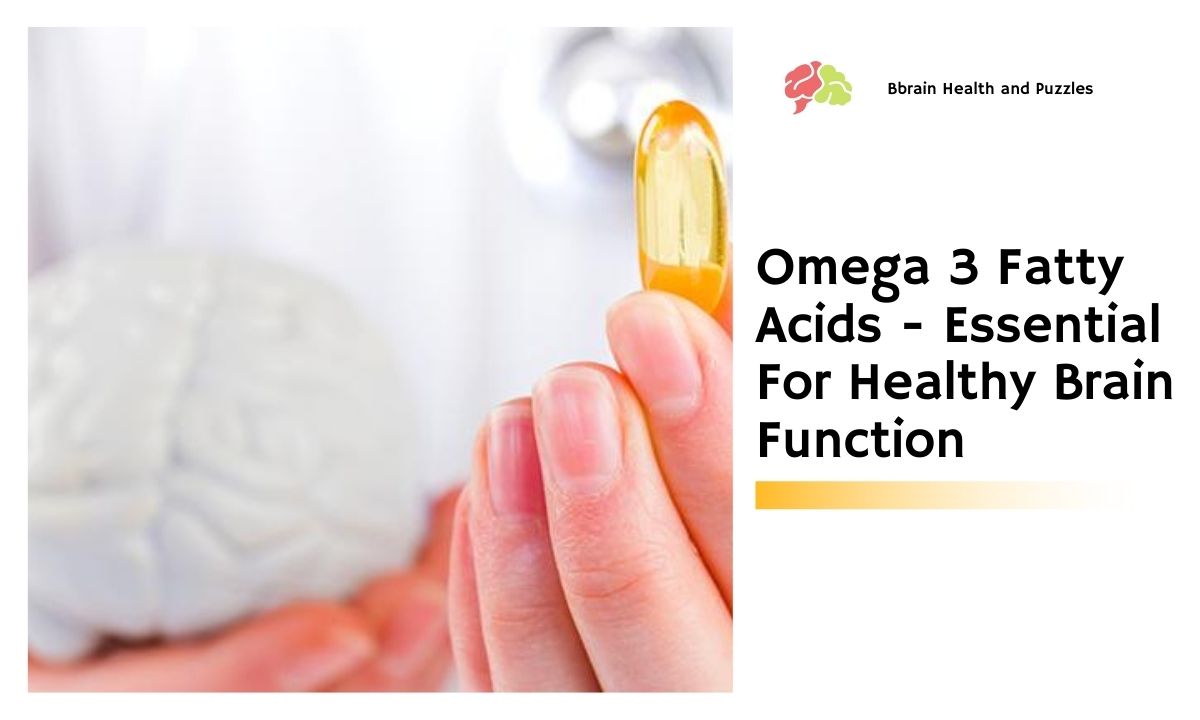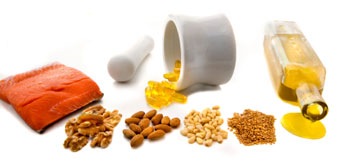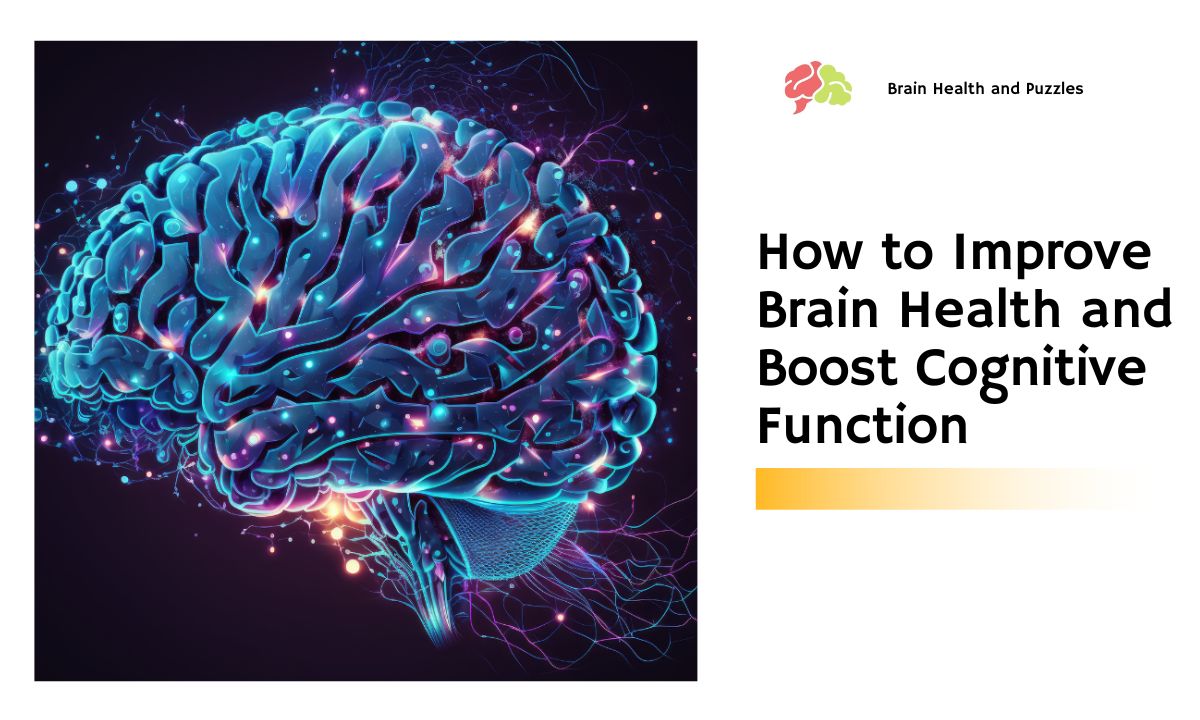Omega 3 Fatty Acids – Essential For Healthy Brain Function

Omega 3 Fatty Acids are essential compounds for human health and growth. There are three of these compounds that have a particular effect on your health: Alpha-linolenic acid or ALA, eicosapentaenoic acid or EPA, and docosahexaenoic acid or DHA. The optimal function of the human brain depends on the presence of Omega 3 fatty acids. They are essential building materials for the brain during development and crucial to proper brain function and maintenance.
These fatty acids improve communication between the cells and are the main ingredient for making myelin sheaths, a protective membrane covering tissue connecting neurons. Deficiencies can lead to hyperactivity, attention deficiency disorder (ADD), dyslexia, violence, depression, memory loss, and various behavioral disorders.
DHA
DHA is an important constituent of the dopamine and serotonin receptors in the brain that are intricately associated with attention management and mood balancing. During child development, the brain forms new neural pathways to facilitate learning. DHA is the critical component of the delicate neural synapses.
In the absence of Omega 3 in the bloodstream, the brain uses other types of fat to synthesize DHA. However, the shapes of trans-fat molecules and omega 3 molecules are not the same and therefore lead to imperfect construction of the synapses. The neural network gradually becomes deformed ultimately leading to the development of learning, memory, and behavioral disorders.
Other Body Benefits
Omega 3’s have been also shown to have wide-ranging effects on the body. Studies suggest that Omega 3’s impact: cholesterol levels (lowering LDL or ‘bad cholesterol’ and increasing HDL or ‘good cholesterol), coronary health, the immune system, developmental health, skin, fatigue, and Cancer!
Choosing Foods With Omega 3
The body cannot synthesize its own Omega 3 fatty acids. But it can synthesize alpha-linolenic acid into all the other Omega 3’s the body needs. So when looking for sources of Omega 3’s make sure to choose foods high in alpha-linolenic acid. Below are fantastic natural sources of Omega 3’s that are found in vegetables and fish but nowadays all kinds of foods are being fortified with Omega 3’s such as eggs, chicken, bread, milk, etc.
Seafood
- Salmon – Wild is better than farmed.
- Sardines
- Trout
- Mackerel
- Halibut
- Oysters
- Herring
- Anchovies
- Mussels
- Clams
- Albacore Tuna
- Huss/Dogfish
- Crab
Vegetables and Nuts
- Seaweed
- Broccoli
- Spinach
- Avocado
- Olives/Olive Oil
- Flax Seed/Oil
- Hemp Seed/Oil
- Canola Seed/oil
- Pumpkin Seed/Oil
- Soybean oil
- Walnut Nuts/Oil
- Tofu
Add Omega 3 To Your Diet
With all its positive effects on the body and especially the brain, it’s a shame that North Americans do not get enough Omega 3 Fatty Acid in their diets. Research has proven that a diet rich in Omega 3’s can be beneficial in numerous ways.
Try to make some different choices in your diet to regularly include more dark green, leafy vegetables, and/or more fish to increase your intake of natural Omega 3 fatty acid. If you just can’t bring yourself to eat more veggies and fish, there are various supplements available that make it easy to get more Omega 3 into your diet.
Fish with Omega 3 – There’s Lots to Choose From!
 We keep hearing about the benefits of a Mediterranean or Asian diet. People who eat fish-friendly diets are generally much healthier than those who don’t! That’s because fish are an excellent source of Omega 3 fatty acids. Not all fish however have meaningful amounts of Omega 3.
We keep hearing about the benefits of a Mediterranean or Asian diet. People who eat fish-friendly diets are generally much healthier than those who don’t! That’s because fish are an excellent source of Omega 3 fatty acids. Not all fish however have meaningful amounts of Omega 3.
Fish with Omega 3 fatty acids typically tend to be fish that live in cold waters and store some fat or oil in their in body tissue. Herbivorous shellfish are also good sources of Omega 3. Below is a list of the seafood that are rich in Omega 3.
Seafood
- Salmon – Wild is better than farmed.
- Sardines
- Trout
- Mackerel
- Halibut
- Herring
- Anchovies
- Albacore Tuna
- Huss/Dogfish
- Oysters
- Mussels
- Clams
- Crab
Eat More Fish
Omega 3 Fatty Acids page for some great vegetable-based sources of Omega 3 and more information on how it affects the brain. To keep a healthy brain stocked with nutrients add some fish to your diet. Not to mention omega 3’s general benefits for the body! So next time you’re out, ask the waiter about the fish. I highly recommend salmon! It’s omega 3 content is through the roof and it’s amazingly delicious!
Super Easy Baked Salmon Recipe
Ingredients
- Salmon filets or steaks of any size
- Lemon Juice
- Butter
- Salt and Pepper
It’s dead simple. Place the salmon in a baking pan with pam or wax paper. Add the lemon juice and butter. Season with salt and pepper to taste. Then just bake away at 375 degrees Fahrenheit for about 15-20 minutes depending on the cut of your salmon. It’s done when the meat flakes easily.



